Connecting North Carolina’s Diverse Energy Economy at the 2019 State Energy Conference of NC

A record number of more than 850 energy professionals gathered in April for the 2019 State Energy Conference of North Carolina in Raleigh, NC.
Attendees came from a variety of backgrounds; including state and local government, non-profit, startups, academia and corporate organizations – suitable for this year’s theme: “Connecting North Carolina’s Diverse Energy Economy.”
Over two days, attendees listened to and connected with industry leaders while sharing their own ideas about North Carolina energy’s present and future. Conference sessions covered a wide variety of energy topics that focused on best practices and case studies about current, emerging and innovative technologies, energy policy, commercial, industrial and institutional buildings, grid modernization, residential homes, renewable energy and utilities and infrastructure.
North Carolina Energy Policy 2019: What’s in Play?
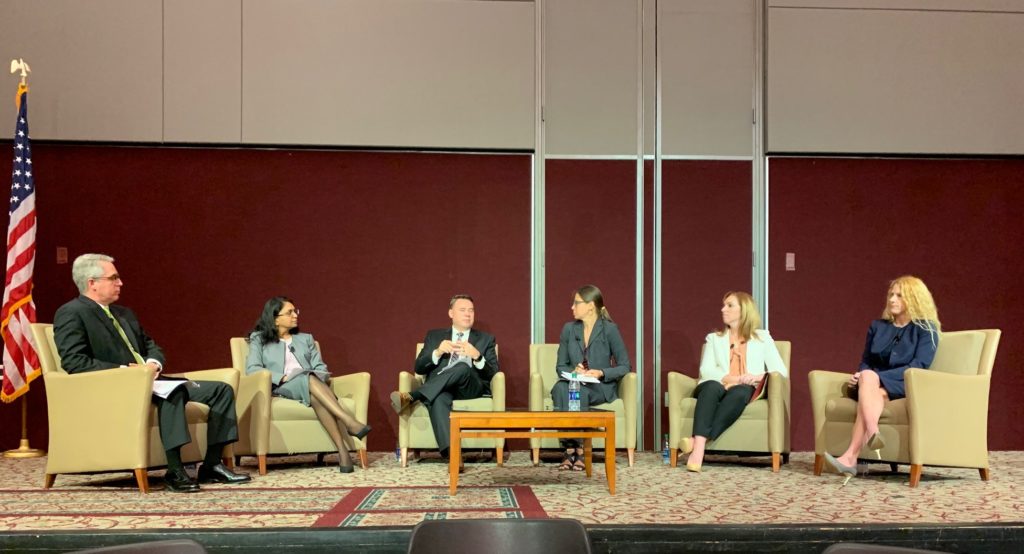
On day one, plenary panel “North Carolina Energy Policy 2019: What’s in Play?” was moderated by Kristi Swartz, Reporter with EnergyWire; and featured John Hardin, Executive Director of the Office of Science, Technology & Innovation, N.C. Department of Commerce; Kendal Bowman, Vice President of Regulatory Affairs and Policy for North Carolina, Duke Energy; Sushma Masemore, Deputy Assistant Secretary for Environment, State Energy Director, N.C. Department of Environmental Quality; Betsy McCorkle, Partner at Kairos Government Affairs; and Scott Tew, Executive Director of the Center for Energy Efficiency & Sustainability at Ingersoll Rand.
Panelists discussed what’s in play for energy policy in the administrative, legislative and regulatory forums, and how Executive Order 80 is making 2019 a pivotal year for energy policy in North Carolina.
“A lot of [Executive Order 80] is about information – doing our homework and getting people information and resources they need to make well informed, smart decisions,” John Hardin said.
Hardin said communicating and working together on energy goals across organizations is crucial.
“It’s always easy for all of us to get in our silos,” Hardin added. “It compels all of us to get out of our silos, to collaborate more and address the cross-cutting issues in a way that we wouldn’t if we were on autopilot going down our paths. I’ve made a lot of new friends and a lot of new colleagues, simply because of Executive Order 80.”
Betsy McCorkle expressed that ideas not only need to be shared within the energy world, but also the legislature.
“Get to know your legislature – educate them. They want to hear from their voters,” McCorkle said.
Sushma Masmore added that while the changes this year will be exciting, they will also be challenging because of all of the new territory.
“To plan out an infrastructure with this much dynamic change occurring is rethinking everything we do,” said Masemore. “We’re all on the same page, but it’s a road that’s less traveled. But it’s an exciting time for us.”
Advancing Clean Energy Solutions Through Stakeholder Collaborations
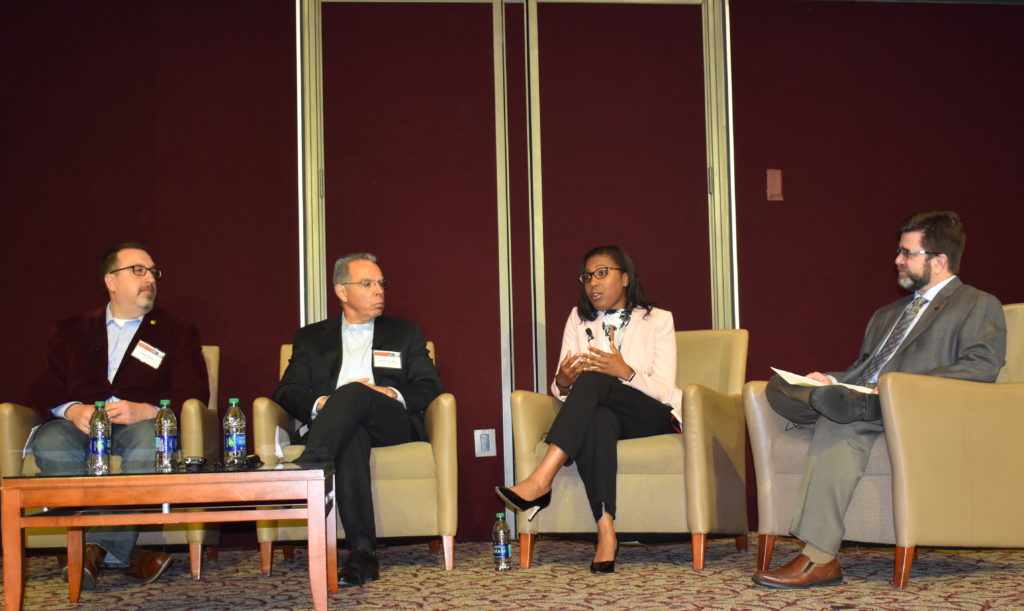
Day two’s plenary panel, “Advancing Clean Energy Solutions Through Stakeholder Collaborations,” was moderated by Stephen Kalland of the NC Clean Energy Technology Center (NCCETC) and featured Steve Chriss, Energy and Strategy Analysis of Walmart; Stephen De May, North Carolina President of Duke Energy; and DeAndrea Salvador, Founder and Executive Director of Renewable Energy Transition Initiative (RETI). This panel of energy stakeholders talked about how they are working together to advance clean energy initiatives tailored to the different needs of communities.
“Usually, the best policies we have in the state come from some level of collaboration,” Stephen Kalland started. “They’re not always easy conversations to have – they take a little work.”
Steve Chriss stated that Walmart engages on both the customer and regulatory side. The company is one of the nation’s leading major corporations on renewable energy, but it tries to adapt its demands for clean energy to the complexity of the issues faced by utilities, he said.
Stephen De May said that energy issues across the state are complex, and resolving them will require working with stakeholders, including utilities, regulators, environmentalists, consumer groups, industrial organizations and more. Not all decisions can be run through a stakeholder group, De May said, but when it makes sense, Duke recognizes the need to go through the process.
“We are doing better, but we still have a long way to go,” De May said.
RETI is an organization that works to eliminate high energy burdens and to make renewable energy solutions more accessible, focusing on those most burdened by energy prices, typically lower-income customers, who are also most likely to be affected by problems caused by climate change.
“We have an incredible opportunity right now and are in the middle of a truly great transition,” DeAndrea Salvador said.
“If the benefits [of clean energy] are not for all of us, they should not be there for any of us,” Salvador said. “So, as we’re looking at North Carolina in the way that we are setting records in solar, we should be constantly evaluating if we’re creating the same opportunities for our families that we’re setting for our large corporations.”
Keynote Speakers
Keynote speakers included Lidija Sekaric, Director of Strategy and Marketing, United States Center of Competence for Distributed Energy Systems (DES), SIEMENS; Katherine Hamilton, Chair of 38 North Solutions; James McCall, Global Product Supply Sustainability Leader at Procter & Gamble (P&G); and Michael S. Regan, Secretary of the N.C. Department of Environmental Quality.
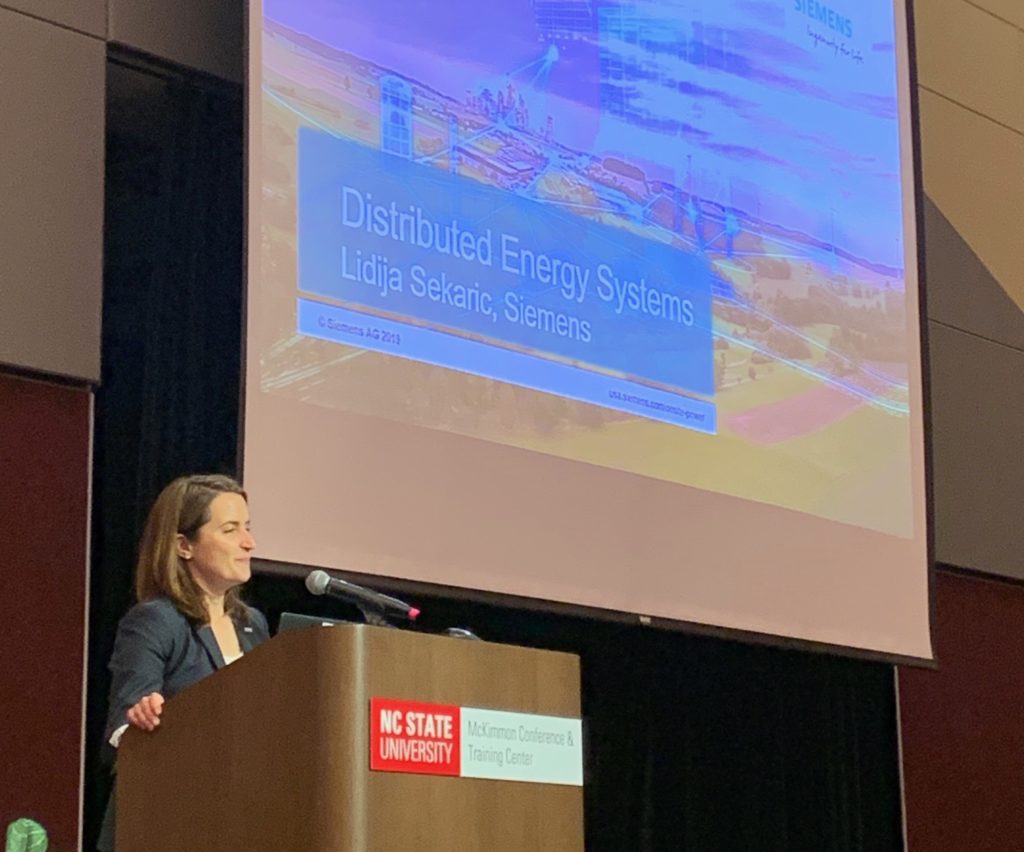
Lidija Sekaric introduced SIEMENS’ new operating company called Smart Infrastructure, which she said describes the company’s interest in the energy world. Smart Infrastructure “intelligently connects energy systems, buildings and industries to adapt and evolve the way we live and work, working with customers and partners to create an ecosystem that intuitively responds to the needs of people and helps customers to better use resources.”
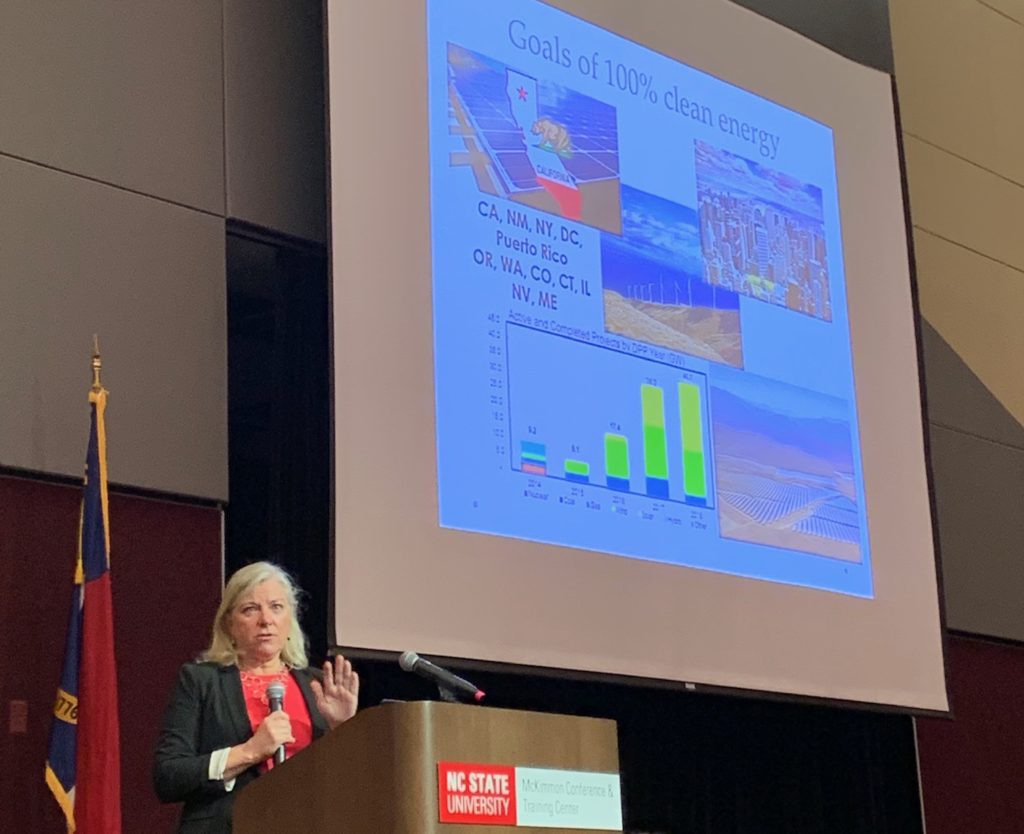
Katherine Hamilton said that recent progress in some clean energy areas is promising, but many technologies still need a strong push to achieve their full potential and deliver a sustainable energy future.
“The solutions for 2030 – we have them now. We have to deploy them faster,” Hamilton said. “We know what we need. People want renewables… this is not a partisan issue. Everybody wants to breathe clean air. Speed things up – hold those elected accountable, hold regulators accountable. Everyone here has to be part of this.”
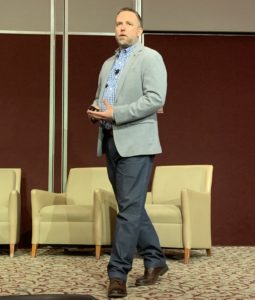
Five million of the seven-plus million people in the world use Procter & Gamble products, James McCall said. That amount of impact means the company needs to constantly evaluate ways it can lessen its carbon footprint, and also try to change consumers’ mindset to allow them to understand that they play a key role, too.
Procter & Gamble goals include finding solutions so that no packaging finds its way to the ocean; protecting water for people and nature in priority basins, and advancing recycling solutions for Absorbent Hygiene Products.
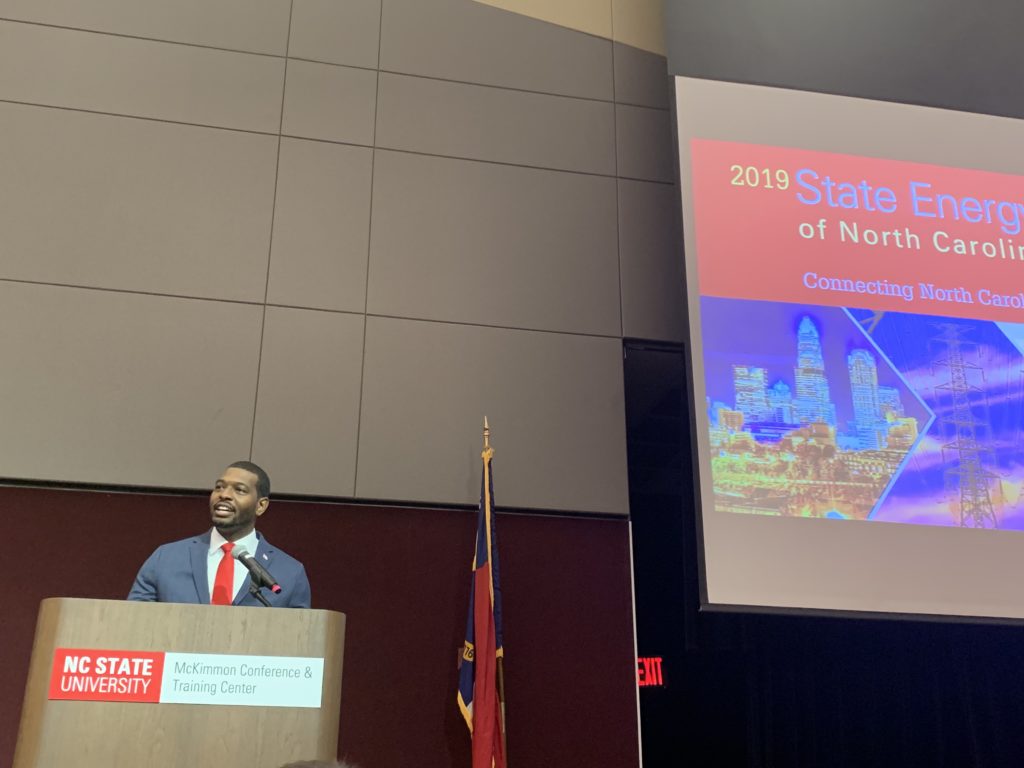
Michael S. Regan spoke encouraging words to the audience on day two.
“North Carolina is historically known for its innovation, creativity and leadership, and that’s on full display today,” Regan said. “That’s why the work each and every one of you are doing is so important to Governor Cooper. He’s challenging all of us to lead. This morning I ask all of us to continue to answer that call and continue to lead.”
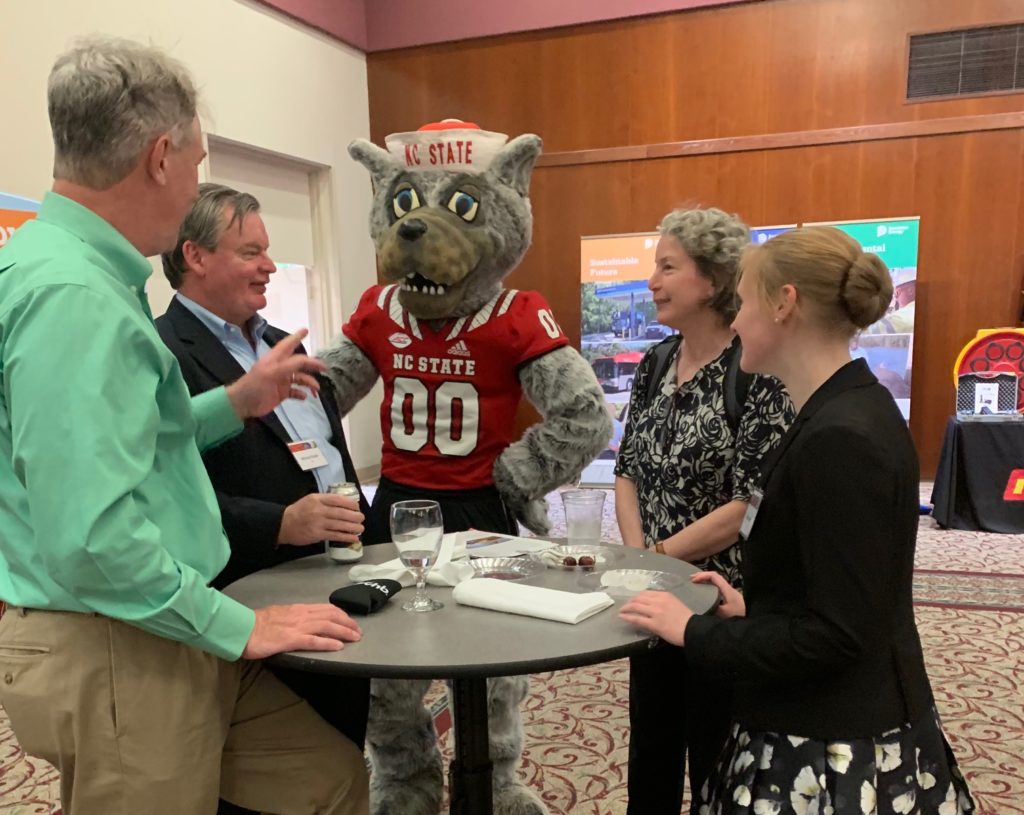
In addition to thorough sessions, keynotes and plenary panels, attendees enjoyed networking with many attendees at the evening reception. This year’s event included Trophy Brewing Company, and a visit with Mr. and Mrs. Wuf from NC State University.
Steve Kalland, executive director with the NCCETC, said one of his main takeaways from the conference is that it’s become increasingly clear that the future of conventional energy resources is a rearguard action as clean energy technologies move forward.
“Utilities are increasingly accepting clean energy resources,” Kalland said. “The real discussion is moving away from when it’ll happen to how fast it’s going to happen, and who’s going to own it. The ‘technology genie’ is generally accepted to be out of the bottle.”
For next year’s conference, Kalland said he hopes to address more of the transition of the utilities sector and the conventional energy space in buildings into this new energy future. He also hopes to find ways to bring more attention to lesser known renewables, to have more discussion on nuclear energy, and to give more attention to solar and wind.
Save the date for the 2020 State Energy Conference, August 28-29, 2020! Learn more at https://ncenergyconference.com/.
